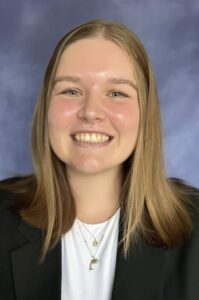Celebrating Our Recent PILS Summer Fellows—Housing and Health
This continuing series of reflections relates the work of some of our recent Public Interest Law Society summer fellows. From Andrea Bishop’s work in housing matters to Mia Stevenson’s appreciation of outreach, we now turn to Alana Borman. Alana spent her summer in the housing unit at Legal Action of Wisconsin. The work was personal and more generally is a reminder of the connection between housing and health.
 By Alana Borman, 2L
By Alana Borman, 2L
My interest in housing started long before I ever started working at Legal Action. It began when I was a child through my mom and her best friend, whom I’ll call Donna. They had been nurses working together for years and had done everything together. As a child, it was routine for me to go to Donna’s house and play in her pool.
Everything was routine until it wasn’t. I noticed Donna was not coming over as much. Instead of working at the hospital, she was being seen at the hospital. She had stage four breast cancer. It was life altering for her. She made the difficult decision to pay for more important things, such as chemotherapy, instead of rent. There were no options for her. She was embarrassed to ask for help, even after everything her and my mom had been through.
We eventually learned she had lost her housing and was staying at a homeless shelter. My mom tried every way possible to get her to come stay at our house, but she remained too ashamed of what had happened. Months would pass without hearing from Donna. A once-vibrant person in my life had drifted away. Donna eventually passed away at that homeless shelter.
There had been no resources for her, no one to turn toward to help her remain in her home. I have no doubt that staying in a shelter did not aid in her situation. It was my goal this summer to understand more about why this happens—why there is a lack of resources in situations like Donna’s where people are forced to decide between housing and survival.
This summer I was exposed to many “Donnas”—people who were just one payment away from losing housing. This included many who were sick and paying for treatments as opposed to rent. Many did not have any place to turn. For some, Legal Action was the only resource .
It was through this experience I realized the many intricacies that go into housing. For some, the eviction comes out of nowhere. They are served a 28-day notice with no warning. Others are merely given a 5-day notice to pay or get out before a proceeding begins. The difficulties that lie in having an eviction action on one’s name are heavy. Even when an eviction action is dismissed and there is no judgment, many cannot find housing because of the eviction even being associated with their name. Of course, in some instances in Milwaukee, a judge will grant name redactions to parties.
Still, the eviction often brings shame just as it did with Donna. There is no real place in the court file to add one’s own story of how it came to be. If people could look closer, many would come to find out that people did not suddenly stop paying out of spite. Rather, there are various reasons for inability to pay. Some individuals have delays in their benefits or their benefits from the state may never come. Others were one paycheck away from losing it all and the ball finally dropped. Many of the people I met were mothers, veterans, young adults who had just left their parents’ homes, and those who were very ill.
There are so many housing needs that are not being addressed, and I encourage all law students at some point to get involved. Much of the information I learned this summer still benefits me as I inform friends and family who rent about the current laws. We all likely know someone who rents or will be a renter.
I am still struck with Donna’s story and how much adequate housing can impact one’s life. Housing for her could have meant a place to come home to rest after a long day of chemotherapy. For others it means the ability to hold a job or provide a place for their children to live. A home means so many things to so many people, it should not be diminished to nothing. Losing a loved one to homelessness has made me deeply aware of how fortunate I am to have a place to call home, something I can no longer take for granted.
Evictions are just one area of the law contributing to homelessness. Legal Action is just one agency working toward reform and keeping people in their housing. The judgment cast toward the homeless or evicted may often be unfounded. Again, an eviction is just one view of a situation that has many layers. Many of the cases in which I was involved this past summer were dismissed because of condition issues, lack of proper accounting or service, and various other issues that normally a client would not know to argue.
This summer came with many hardships but also with self-reflection. I have now had the ability to add to my version of Donna’s story to make the bad ending good. She truly guided me through everything this summer. I hope to take with me the stories of people I worked with this summer and draw on them for inspiration during my journey in law school and beyond.

 By Mia Stevenson, 2L
By Mia Stevenson, 2L At least twice a week this past summer, I worked with a tenant who, like dozens of others present in the Milwaukee County Courthouse, was moments away from losing their home—until we stepped in. This is the difference that adequate counsel can play in a person’s life.
At least twice a week this past summer, I worked with a tenant who, like dozens of others present in the Milwaukee County Courthouse, was moments away from losing their home—until we stepped in. This is the difference that adequate counsel can play in a person’s life.